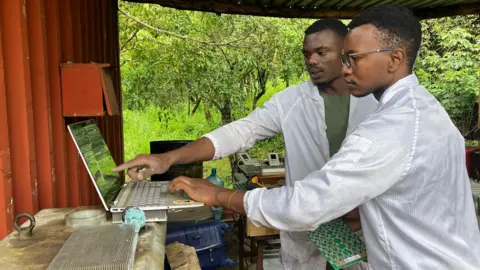 BBC
BBC
Engineers from Gridless create makeshift computer labs to maintain their bitcoin mines
The roar of the Zambezi is deafening as millions of gallons of water crash over rocks and tumble down rapids.
But there's another sound cutting through the trees of the Zambian bush - the unmistakable high-pitched whine of a bitcoin mine.
"It's the sound of money!" says a smiling Philip Walton as he surveys the shipping container with 120 computers busily crunching through complex calculations that verify bitcoin transactions.
In exchange they are automatically rewarded bitcoin by the network.
We're in the far north-western tip of Zambia near the border with the DRC, and of all the bitcoin mines I've visited - this one is the strangest.
Water and electronic equipment don't usually mix well but it's precisely the proximity to the river that's drawn bitcoiners here.
Philip's mine is plugged directly into a hydro-electric power plant that channels some of the Zambezi's torrent through enormous turbines to generate continuous, clean electricity.
More importantly for bitcoin mining - it's cheap.
So cheap it made business sense for Philip's Kenya-based company Gridless to drag its shipping container full of delicate bitcoin mining computers across bumpy narrow roads 14 hours from the nearest major city to set up here.
Each machine makes about $5 (£3.90) a day. More if the price of coins is high, less if it drops.
Occasionally Philip glances down at his smart watch - the home screen showing the ever-changing squiggly line of bitcoin's dollar value.
At the moment it's around $80,000 a coin, but Philip says they can make a profit even when the value of the bitcoin goes low thanks to the cheap electricity on the site and the partnership they have with the energy company.
"We recognised that in order to get better mining economics we needed to partner with the power company here and give them a revenue share. And so the reason we're willing to come out here somewhere so remote is it allows us to effectively get cheaper power," he says.
Zengamina hydro-power plant is huge but technically it's a mini grid - a standalone island of power for the local community.
Advertisement






